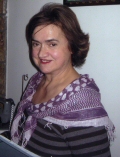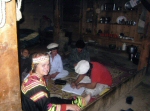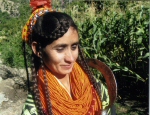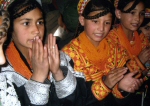Elizabeth Mela-Athanasopoulou

1. University Degrees
1995 Ph.D. in Linguistics (Honours)
English Department, School of Philosophy, University of Thessaloniki, Greece
Ph.D. Thesis: “Bracketing Paradoxes In English and Greek”
1981 Ìasters of Árts (Honours)
Linguistics Department, University of California, Davis, U.S.A.
Masters Thesis: “Syntactic Groups In English”
Specialization - Morphology
Linguistic Morphology – Lexical / Inflectional Morphology
Linguistics. Historical Linguistics. Translation Theory and Practice
Recent specialization – Documentary Linguistics
Fieldwork on Language Documentation. ModGreek dialect Documentation.
2. Scholarships – Distinctions
- State Scholoraship (highest marks at University Entrance Examinations)
- State Scholoraship (4-year scholarship for highest marks in all 4 years of studies)
- British Council Scholarship. two-month Summer Course in Phonetics, University of Reading
- Fulbright Scholarship. four-month Summer Course in Linguistics, University of California, San Francisco, U.S.A.
- Two-year Yarborough-Harsh and Fulbright Scholarships. For the Masters of Arts studies at the University of California, Davis, U.S.A.
- British Council Scholarship. Two-month Summer Course in Linguistics, Polytechnic of Central London (P.L.C.) (now University of Westminster), U.K.
- Invitation from the American Embassy in Athens for the International Language Teaching Method Workshop by Dr. John Rassias of Dartmouth College, New Hampshire, USA, at Istanbul Technical University, 12-15 November 1997.
- Ministry of Education Scholarship of the Direction of Postgraduate studies and Research. Special fund for fieldwork and research of the Kalasha language, Himalayas.
- Ministry of Education Scholarship of the Direction of
Postgraduate studies and Research. Special fund for fieldwork and research
of the Kalasha language, Himalayas.
3. Professional Career
| 1997-2001 | Lecturer in Linguistic Morphology at the School of English Department of Theoretical and Applied Linguistics, Faculty of Philosophy, Aristotle University of Thessaloniki, Greece |
| 2001-today | Assistant Professor in Linguistic Morphology at the School of English Department of Theoretical and Applied Linguistics, Faculty of Philosophy, Aristotle University of Thessaloniki, Greece |
4. Teaching Appointments
| 1984-1985 | Phonetics-Phonology (Compulsory) |
| 1995-1996 | Introduction to Theoretical Linguistics(Compulsory) |
| 1983-2001 | Ling 2-210RE Translation Theory and Practice |
| 1998-2001 | Ling 4-315RÅ Translation Practice |
| 1981-2001 | Ling-2 220RÅ Introduction to Morphology |
| 1997-2001 | Ling 3-299RÅ Inflectional Morphology |
| 2002-2003 | Ling 2-220RE Introduction to Morphology Ling 3-299RÅ Inflectional Morphology Ling 2-370 RE History of the English Language Ling 2-210RE Translation Theory and Practice |
| 2003-2005 | Ling 2-220RE Introduction to Morphology Ling 3-299RÅ Inflectional Morphology Ling 2-370 RE History of the English Language Ling 2-210RE Translation Theory and Practice |
| 2006-2009 | Ling 2-220RE Introduction to Morphology Ling 3-299RÅ Inflectional Morphology Ling 2-370 RE History of the English Language Ling 2-399E: Special Electives: Issues on Language Documentation and Description |
| 2009-today | Ling 2-220RE Linguistic Morphology Ling 3-388Å Inflectional Morphology Ling 2-399E Special Electives: Issues on Language Documentation and Description |
5. Teaching Material
6. Research Work – Publications
É. Theses
- "Syntactic Groups in English" Masters of Arts in Linguistics, (Honours) University of California, Davis, USA, 1981
- "Âracketing Paradoxes in Morphology" Doctoral Dissertation, (Honours) English Department, School of Philosophy, Aristotle University of Thessaloniki, Greece, 1995
II. Books
- Introduction to Morphology. 1995. E. Mela - Athanasopoulou, Published by Christodulides Publications, Thessaloniki, Greece. Pp. 1-135.
- Linguistic Morphology. 2006. Aristotle University of Thessaloniki. Published by the University Studio Press, Thessaloniki. Pp. 1-312.
- Documenting the Kalasha language. 2011. Aristotle University of Thessaloniki. (at the publishers) Pp. 1-280.
III. Teaching manuals
- (a) Modern English. Lectures on Pronounciation
(b) Modern English. Lectures on Reading Comprehension. University of Thessaloniki. - Phonetics: Association of Symbol Descriptions and Sound Production. (accompanied by slides), 1980. University of California, Davis, USA, Innovative work funded and published by the University of California, Davis, Linguistics Department.
- Translation Theory and Practice Manual. 1984. Aristotle University of Thessaloniki Publications.
- Lectures on Inflectional Morphology in English and Modern Greek. 1997. Aristotle University of Thessaloniki Publications.
- Lectures on the History of of the English Language. 2003. Aristotle University of Thessaloniki Publications.
- Lectures on Language Documentation and Description ModGreek dialects. 2010. Aristotle University of Thessaloniki Publications.
IV. Publications in Linguistic Journals and Selected Papers Proceedings of International Conferences and Symposia or Meetings
- Inflections and Syntactic Groups. A comparative study in English and Greek. 1986. 1st International Symposium on English and Greek, Department of Theoretical and Applied Linguistics, School of English, Aristotle University of Thessaloniki.
- Clitics are in the Morphology: A case study in ModGreek. 1993. 7th International Symposium on English and Greek, Department of Theoretical and Applied Linguistics, School of English, Aristotle University of Thessaloniki.
- The Productivity of Ancient Greek Prepositions in Modern Greek Nominalizations. 1993. 10th International Symposium on English and Greek, Department of Theoretical and Applied Linguistics, School of English, Aristotle University of Thessaloniki.
- Argument Structure in Morphology. In G. Drachman, A. Malikouti-Drachman, J. Fykias and C. Klidi, Greek Linguistics 95, Vol I, W. Neugebauer Verlag Gmbh, Graz, AUSTRIA, 1997, p. 187-196
- The Categorial and Semantic Effect of the Derivational Suffix in Modern Greek. 1999. 3rd International Congress of Greek Linguistics of the Linguistics Department of the University of Athens, Athens, p. 352-361
- Meaning and function of the derivational prefix in English. Journal of Working Papers in Theoretical and Applied Linguistics, Vol. 6, Thessaloniki 1999. Pp. 41-53
- Towards a stem-based Morphology. In Æ. Catalan, C. Stamenov, E. Pancheva, Seventy years of English and American Studies in Bulgaria. St. Kliment Ohridski University Press, Sofia. BULGARIA 2000, p. 76-82
- The Dartmouth Method of ELT and the Greek EFL teacher. 1999. 12th International Symposium on English and Greek, Department of Theoretical and Applied Linguistics, School of English, Aristotle University of Thessaloniki
- A New Technique of Summary Writing. Presented at the IV Simposio International de Didactica de la Lengua y Literatura L1 y L2, Facultad de Filosofia y Letras , Universitad de Cordoba, Cordoba, ESPANA. 29 DE Noviembre al 3 de Diciembre 1999.
- The pseudostem Xo, as in -foro, -volo, -doto, etc. of karpoforo, rizovolo, daniodoto, etc. in ModGreek. In Studies in Greek Linguistics of the 20th Annual Meeting of the Department of Linguistics, Aristotle University of Thessaloniki. Thessaloniki 2000, p. 336-347
- English loans in Modern Greek. In Studies in Greek Linguistics of the 22nd Annual Meeting of the Department of Linguistics, Thessaloniki 2000.
- Meaningless Prefixes in English Word-Formation. In the Selected Papers of the 13th International Symposium on English and Greek, Department of Theoretical and Applied Linguistics, School of English, Aristotle University of Thessaloniki. Eds. NIkolaidis, K. & M. Mattheoudaki. Thessaloniki 2000. Pp. 115-125.
- Reading. Issues, periodical vol. 7, March 2001, ed. EKADEVE, Thessaloniki.
- A new technique of summary writing. Journal of Applied Linguistics, Greek Applied Linguistics Association, Thessaloniki 2001, p. 27-31
- The Gender of the English Derived Nominal and the Modern Greek Counterpart. Journal of Linguistics, The Thessaloniki Papers, 2001
- The argument structure of the -is, -'es 3rd declension compound adjectives in ModGreek. 2001. In the Proceedings of the 4th Internationqal Conference on Greek Linguistics, University o0f Cyprus. CYPRUS. Edited by Agouraki G. et al. pp. 146-153.
- Translating gender from SL (English) to TL (Modern Greek). A morphological approach. In the Selected Papers from the 3rd International Conference of the Hellenic Association for the Study of English, Aristotle University of Thessaloniki. Edited by Eliza Kitis in Vol II: Aspects of Language and Culture: The Other Within. Thessaloniki 2001. Pp. 113-123.
- Communicative and Semantic Translation in English and Greek. 2001. In "The Contribution of Language Teaching and Learning to the Promotion of a Peace Culture", 12th International Conference. Greek Applied Linguistics Association, Vol. 8. Thessaloniki
- The Productivity of Prepositions in English and Modern Greek. 2001. In the Selected Papers of the 14th International Symposium on Theoretical and Applied Linguistics, School of English, Aristotle University of Thessaloniki. Edited by Marianthi Makri-Tsilipakou. Thessaloniki 2002. Pp. 248-256.
- The Role of the Morphemes in First Language Acquisition. Evidence from Modern Greek. 34th Meeting of the Societas Linguistica Europaea, 22-25 July 2002, Potsdam GERMANY.
- The productivity of the derivational suffix in English. Journal of Working Papers in Linguistics, Vol. 7, Thessaloniki 2002
- The Derivational Suffix in English: Its Categorial and Semantic Effect. Presented at the 34th International Conference on Language Study in Europe, University of Leuven, BELGIUM, 28-31 August 2002.
- Deverbal Prepositions in Modern Greek and English. 2002. Actes du 5e Colloque Interational de Linguistiqu Greque. Sorbonne, 13-15 Septembre 2001. Published by L’ Harmattan, 2002. Paris, FRANCE.
- English Loan Words in Modern Greek. In New Englishes, edited by Vasilia Bolla-Mavrides. Thessaloniki, 2003. Pp. 109-120.
- Phonaesthemes: Evidence from English and Modern Greek. In the Selected Papers of the 15th International Symposium on Theoretical & Applied Linguistics. Edited by E. Mela-Athanasopoulou. Thessaloniki, 2003. Pp. 181-191.
- Adjectival Participles. Evidence from Modern Greek. 2004. Presented at the 11th International Morphology Meeting, University of Vienna, Vienna, AUSTRIA.
- The Derivational Suffix in English: Its Categorial and Semantic Effect. In Working Papers in Linguistics. Edited by Eliza Kitis. Thessaloniki 2004. Pp. 85-102.
- Morphologization of synthetic prepositions in English and Modern Greek. In the Selected Papers of the 16th International Symposium on Theoretical & Applied Linguistics. Edited by Mattheoudaki, M & A. Psaltou-Joycey Thessaloniki, 2005. Pp. 118-132.
- Translating gender from SL (English) to TL (Greek). Presented at the 5th Conference “Hellenic Language and Terminology”, Nicosia, CYPRUS 13-15- October 2005.
- Adjectival Participles of Unaccusative Verbs. Evidence from Modern Greek. 7th International Conference on Greek Linguistics. 8-10 Sept 2005. Published at the internet site of the University of York, ENGLAND
- The polysemy of –ize derivatives and the ModGreek counterpart –pi´o. In the Selected Papers on Theoretical and Applied Linguistics, Vol. 1 Edited by E. Agathopoulou, M. Dimitrakopoulou & D. Papadopoulou. Thessaloniki 2007. Pp. 157-167.
- Phono-semantically motivated lexical patterns: Evidence from English and Modern Greek. In the Selected Papers of the 6th International Conference on Greek Research, Modern Greek Department, Flinders University, Adelaide, Australia. Pp. 223-243. 21-29 June 2005. Edited by Elizabeth Close et al., Flinders University, Adelaide, AUSTRALIA 2007. Also in http://hdl.handle.net/2328/1769.
- The Gender of the English Derived Nominal and the Modern Greek Counterpart. A Morphological Approach. In the Selected Papers of the 7th International Conference on Greek Research, Modern Greek Department, Flinders University, Adelaide, Australia. 21June – 4 July 2007. Edited by Elizabeth Close et al., Flinders University, Adelaide, AUSTRALIA 2009, pp 293-308
- Ç äéäáóêáëßá ôçò ËåéôïõñãéêÞò ×ñÞóçò ôçò ÍÝáò ÅëëçíéêÞò óôïí Ðñïöïñéêü êáé Ãñáðôü Ëüãï. In the Selected Papers of the 7th International Conference on Greek Research, Modern Greek Department, Flinders University, Adelaide, Australia. 21June – 4 July 2007. Edited by Elizabeth Close et al., Flinders University, Adelaide, AUSTRALIA 2007(at the publishers)
- Conversion: A typological and functional analysis of the morphophonological structure of zero-derivation in English word formation. Selected papers of the 18th International Symposium on Theoretical & Applied Linguistics. Edited by Anastasios Tsangalidis. Thessaloniki, 2009. Pp. 273-280.
- A Morphophonological description of Kalasha as an Indo-Aryan Language with Ancient Greek Roots. In the Selected Papers of the International Conference on Language Documentation and Tradition (ICLDT-Ka) 7-9 Nov. 2008. Aristotle University of Thessaloniki. Edited by Everhard Carol, Elizabeth Mela-Athanasopoulou & Youli Theodosiadou. Thessaloniki 2011 University Studio Press (at the publishers)
- The Kalasha woman today. In the Selected Papers of the International Conference on Language Documentation and Tradition (ICLDT-Ka) 7-9 Nov. 2008. Aristotle University of Thessaloniki. Edited by Everhard Carol, E. Mela-Athanasopoulou & Youli Theodosiadou. Thessaloniki 2011 University Studio Press (at the publishers)
- How many are we? A Demographic Research of the Kalash. In cooperation with Taleem Khan, the Selected Papers of the International Conference on Language Documentation and Tradition (ICLDT-Ka) 7-9 Nov. 2008. Aristotle University of Thessaloniki. Edited by Everhard Carol, E. Mela-Athanasopoulou & Youli Theodosiadou. Thessaloniki 2011 University Studio Press (at the publishers)
- Documenting the Kalasha language: Some Challenges and Solutions. In the 1st International Conference on Language Documentation and Conservation (ICLDC) University of Hawaii, Honolulu. March 2009 Published at http://hdl.handle.net/10125/5005 Hawaii, USA
- Semantically Motivated Suffixes in Gender Inversion. Evidence from ModGreek. In the Proceedings of the 9th International Conference on Greek Linguistics. University of Chicago, USA. Ed by Brian Joseph at al. University of Chicago 2011 (at the publishers)
- The Function of Semantically Motivated Suffixes in Gender Inversion of Modern Greek Derivatives. In the Selected papers of the 19th International Symposium on Theoretical & Applied Linguistics. Edited by Anastasios Tsangalidis. Thessaloniki, 2011, pp 337-343.
- Adjectival Participles: a morphological approach. Evidence from Modern Greek. In the Selected papers of the 20th International Symposium on Theoretical & Applied Linguistics. Edited by N. Lavidas. Thessaloniki, 2011, (in press).
- First steps to endangered language documentation: the Kalasha language, a case study. IJOAL Vol. 37, No 2, 2011 (at the publishers)
- A morphophonological description of Kalasha as an Indo-Aryan language with Greek roots. US-China Foreign Language Journal, David Publishing Co, Chicago, Ill., USA 2011 (at the publishers)
VII. Attending International Conferences and Meetings in Greece and Abroad
- Mediterranean Meeting on Morphology II, University Residence, Lija, MALTA 10-11 Sept. 1999.
- 9th International Morphology Meeting 25-27 Feb 2000. University of Vienna, AUSTRA
- All the Annual Mett]ings held by all the Greek LinguisticsDepartments at the Universities of Thessaloniki, Athens , Patras, Crete Mytilene and Cyprus – Certificates of attendance available.
VIII. Editor-in-Chief
- Elizabeth Mela-Athanasopoulou (editor). 1997. Proceedings of the 10th International Symposium on Theoretical & Applied Linguistics. Department of Theoretical & Applied Linguistics, School of English, Aristotle University of Thessaloniki, Thessaloniki. 309 pages, Philippos Tsialas Press.
- Elizabeth Mela-Athanasopoulou (editor). 2001. Proceedings of the 15th International Symposium on Theoretical & Applied Linguistics. Department of Theoretical & Applied Linguistics, School of English, Aristotle University of Thessaloniki, Thessaloniki. 635 pages, Philippos Tsialas Press.
- Elizabeth Mela – Athanasopoulou (editor) 2011. Selected Papers of the International Conference on Language Documentation and Tradition (ICLDT-Ka) 7-9 Nov. 2008. Aristotle University of Thessaloniki. In cooperation wuith Carol Everhard & Youli Theodosiadou. Thessaloniki 2011 University Studio Press (at the publishers)
Fieldwork research on the Kalasha of the Hindu Kush valleys, Himalayas
In the last five or six years Dr. Elizabeth Mela-Athanasopoulou has shown an upsurge of interest in language and dialects threatened by extinction. In particular, in Spring 2005 (May-June), during her sabbatical in London , she attended relevant courses on language documentation at the University of London, School of Oriental and African Studies and chose the Kalasha language as a case study. There at the SOAS library when she accidentally came across Morgenstierne’s (1973) volume on the Kalasha language, she grew a keen interest when she found out Ancient Greek roots in Morgenstierne’s scripts of the language. In order to confirm her assumptions of a possible Greek origin language, she decided to conduct herself fieldwork research on Kalasha, after having investigated all relevant bibliography and archives on the Kalasha language and culture in London.
Two years later (April-July 2007) she endeavored the perilous trip to the Himalayas along rapid rivers and precipitous vertical cliffs in order to get to the valleys (Bumburet, Rumbur and Birir) of Chitral at the North West frontier of Pakistan and Afghanistan where the Kalasha tribe lives. Welcomed by their warm hospitality she stayed with them experiencing a primitive way of life. The aim was to document and describe a living language threatened by extinction. On the other hand, the analysis of the recorded linguistic material in the natural environment of the native speakers would shed light and consolidate her assumptions of Ancient Greek influences upon the language as well as culture and tradition, as she had confirmed in the course of time. She was lucky to have been surrounded by people who indeed yearn to learn about their own roots and language. Her main language consultant Mr. Taleem Khan took her to the most remote villages of the three valleys to record and video all kinds of varieties of the Kalasha language: everyday spontaneous conversations, hymns and tales at their rituals, cultural ceremonies and events (weddings, funerals, etc.).
The research sponsored by the Ministry of Education in Greece was interrupted when Ms. Mela had to return home seriously ill. Yet, she did not give up. In August 2008, her Kalasha group (Taleem Khan, Zahir Sha, Yuhanna), with Taleem Khan in charge, conducted under her guidelines a demographic research of all the fifteen villages dispersed in the three valleys, the results of which were presented by her and Taleem Khan at the International Conference on Language Documentation and Tradition, which she organized at Aristotle University of Thessaloniki in November 2008. At the Conference Ms Mela presented the first results of her fieldwork study with the title “A morphophonological description of Kalasha as an Indo-Aryan language with Greek roots”. Based on direct documentation of personal data collection in her fieldwork research of the Kalasha language, she showed that the language has certainly been influenced by Ancient Greek. After a thorough morphophonological analysis of the fieldwork data it was exhibited in her paper that the Kalasha language has the remnants of a full synthetic case-marking inflectional system of Ancient Greek. Moreover, verbal inflections and their argument structures, as well as past mparticiple as absolute genitive and grammaticalization phenomena show how much of Ancient Greek is still alive in Kalasha. On the other hand, in terms of lexical morphology, Kalasha has retained an abundance of Ancient Greek lexical items – despite, of course, the various influences and loans from other languages (e.g. Khowar, Urdu, Persian, Arabic, Sanskrit and even English).
In March 2009, granted a scholarship by the Rectorate, Aristotle University of Thessaloniki, she participated in the 1st International Conference on Language Documentation and Conservation at the University of Honolulu, Hawaii, USA. The title of her work was “Documenting the Kalasha Language: Some Challenges and Solutions”, published at http://hdl.handle.net/10125/5005. After a brief display of the basic typology of elicitation techniques to document the Kalasha language, she proved with her natural audio-visual recordings how most essential documentation is for the revitalization of the language pressurized by outside forces. She also showed, in that paper, how the native speakers can be motivated to use their language at all circumstances. Therefore, she proposed the production of a descriptive grammar and a series of text-books.
In August 2009 she attempted the second trip to the Himalayas and lived with the Kalash families. The aim was to record more primary data of all age groups and also learn the language – as very few of them speak English. So, she communicated with them in the Kalasha language only. The research was interrupted again and she had to leave the Kalash valleys due to the frequent invasions to the valleys of the Taliban group. The analysis was now performed in Greece. With the native speaker Taleem Khan by her side she has been analyzing, transcribing and translating into English the recordings of authentic linguistic material. The work is huge, grave and time-consuming.
In parallel line, within the framework of courses she teaches at Aristotle University, English Department of Linguistics (Lings 2.399 Language Documentation and Description) she is conducting fieldwork research on those Greek dialects threatened by extinction. “Language Documentation is a challenging, tiresome and time-consuming activity but it is worth the effort”, says Mrs. Mela – Athanasopoulou.
Photos from the fieldwork research in the Kalash valleys of Bumburet, Birir and Rumbur







